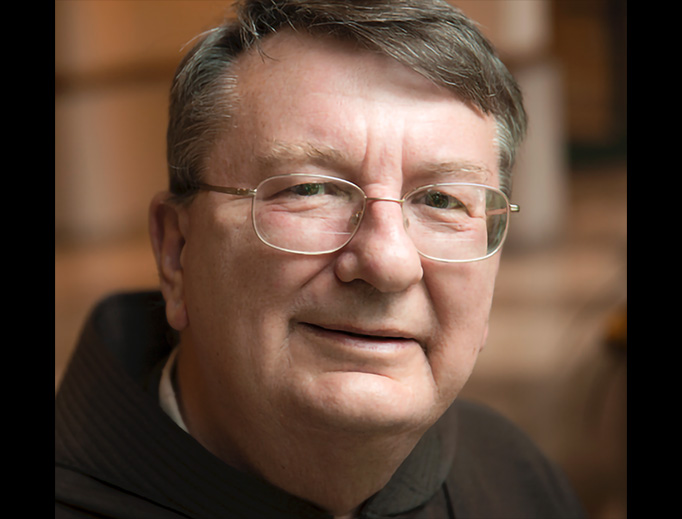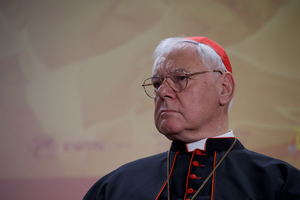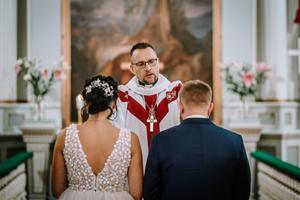How to Tackle the Challenge of Lukewarm Catholics
Capuchin Father Thomas Weinandy, a member of the International Theological Commission, discusses his organization’s latest document on the subject.

Many Catholics today marry in the Church, are confirmed and receive the Eucharist, but some of them participate in these sacraments with little faith, and so do not fully reap the benefits of the grace that the sacraments offer.
This can especially be the case with regards to marriage where baptized couples can often wed as nominal Catholics who hardly, or otherwise never, go to church. Such situations have become an ever-present challenge in today’s Church, especially in the West, and have been raised by Popes St. John Paul II, Benedict XVI and Francis.
The International Theological Commission (ITC), a body set up by St. Paul VI in 1969 to advise the Holy See on doctrinal questions of major importance, has sought to tackle this problem in a new document called “The Reciprocity Between Faith and Sacraments in the Sacramental Economy.”
The fruit of a five-year study, the document stresses the inherent relationship between faith and the sacraments. It also underlines the Church’s teaching that the sacraments by their very nature are sacraments of faith, and faith is needed in order to receive the sacraments properly and fruitfully. The Church considers this relationship especially important when it comes to the sacrament of marriage, where the couple are the ones who enact the sacrament through their marriage vows. But this study includes not just marriage, but also the sacraments of baptism, confirmation and the Eucharist.
In this March 11 interview with the Register, Capuchin Father Thomas Weinandy, who was a member of the ITC’s sub-commission on the topic, explains more about the reasons behind the document, how it reinforces the need for faith when receiving the sacraments, and what he hopes the document will achieve pastorally and theologically.

Father Weinandy, why did the International Theological Commission decide to conduct this five-year study that led to the document “The Reciprocity Between Faith and Sacraments in the Sacramental Economy”?
The ITC always tries to choose topics that are theologically and pastorally relevant. So the past commission chose to examine three topics: synodality, religious freedom, and the relationship between faith and the sacraments. I was a member of the sub-commission that worked on this last topic. The reason this topic was chosen is due to the real problem that exists within the Church today. People participate in the sacraments but often have little or no faith. So parents want to have their children baptized, but they themselves have little faith and rarely attend church. They are only nominally Catholic.
Likewise, we have the Christmas-and-Easter Catholics who come to Mass only on those solemnities and receive Communion and never go to confession. Again, they are nominal Catholics but do not really practice their faith. Then there is the real problem of couples wanting to be married in a Catholic Church but they, too, are not practicing Catholics. They were never raised Catholic and know little or nothing about their faith. Often, they simply want a nice church in which the bride can walk down a beautiful aisle to the sound of triumphal organ music. Sometimes, they do not really want to get married in the Church but are doing so only to please their parents. It is for all of these reasons, and more, that the ITC decided to address the issue of the relationship between faith and the sacraments.
To what extent does the document reinforce the importance of faith in the other sacraments?
The document, I think, very strongly reinforces the importance of faith in relationship to the sacraments. It stresses the importance of Catholic doctrine and morals and that these doctrines and morals ought to be believed if one is going to be an authentic Catholic. It is only in truly believing in the faith of the Church that one’s faith comes alive — is a living faith. Thus, while a minister may sacramentally baptize a child and that child is truly baptized, if that child does not grow up in a family that is practicing and living the faith, the child will not likely mature in the faith. Christmas-and-Easter Catholics may attend Mass on those days and receive Communion, yet because of their little faith, they may not receive much spiritual benefit from such attendance or reception. Actually, if they are in the state of mortal sin, such reception of Communion could be to their condemnation.
The document attempts to show the inherent relationship between faith and participation in the sacraments. Faith and sacraments are intimately bound together.
How can one evaluate how much faith a person has, especially if they’re preparing for marriage?
We believe as Catholics that sacraments effect what they symbolize and symbolize what they effect. Thus, when the ordained priest calls down the Holy Spirit upon the bread and wine and says the words of consecration, we know in faith that the bread and wine are changed into the Body and Blood of Jesus. In marriage, within the Catholic Church, it is the couple who effect the sacrament of marriage. The priest is the official Church witness to their enactment of the sacrament. Within all of the sacraments the minister of the sacrament must have the intention of doing what the Church does within those sacraments. So, for example, the priest may not believe in transubstantiation but he intends to do what the Church does; then the bread and wine will be changed into Jesus’ risen Body and Blood.
Here is where the problem within the sacrament of marriage becomes tricky. Most Catholic couples probably intend to effect a truly sacramental marriage — even if they do not have a great deal of faith, nor practice their faith to any great extent. Thus, they are sacramentally married, and such a sacramental bond cannot be broken or annulled. However, sometimes pastors get the impression that a couple is so ignorant of their faith and have never practiced their faith, that the pastor wonders if they are incapable of doing what the Church does within a sacramental marriage. The couple may be baptized, and so empowered to enact a sacramental marriage, but because of their lack of faith, are they even capable of enacting their baptismal privilege? This is very hard to judge, but the document suggested, and it is not a new suggestion, that at times such is the case. Because of their complete ignorance of the faith and complete non-practice of their faith, they may be incapable of effecting a sacramental marriage. A marriage tribunal would have to make the canonical judgment in such a situation if later the couple wished to get a divorce and remarry. These are real problems that a pastor often faces; and the document is attempting to address these issues in a way that is faithful to Church teaching and to the pastoral reality that is at hand. There are no simple, easy answers to these pastoral problems.
Could it be argued that merely the decision to enter sacramental marriage shows a degree of faith, however small or unconscious, and that, as with every sacrament, there is a transmission of grace that helps the couple to honor the sacrament?
Under normal circumstances this would be a given and so true. But what about the case where the couple really wanted to get married on the beach before a justice of the peace, and the only reason they want a wedding in a Catholic church before a Catholic priest is because Mom has now insisted upon it. So for the sake of family peace, the couple go along with “the church” wedding. The sacramentality of the event does not enter their minds, and they could care less. They do not even know what it means for marriage to be a sacrament. They will say “Yes” to all of the priest’s preparatory questions, not because they believe what is being asked, but because they just want to get on with it — Mom wants them to get married in church so that is what they are doing and will say and do anything to assure this.
What are you overall hopes for this document — what would you like to see it achieve, both pastorally and theologically?
I would hope that the document brings into focus the necessary theological relationship between faith and the sacraments. The sacraments, to be received fruitfully, must be accompanied by faith. The more that one’s faith is alive, the more the grace of the sacraments will enliven those one who participate in them. Moreover, I hope it will be of some value not simply to theologians, but also to pastors. They are the ones who are confronted daily with these pastoral issues. Hopefully, by clarifying and articulating the relationship between faith and the sacraments, they will be better able to discern and address these pastoral issues. I think the most pressing concern is that the Church, as a whole, sees the need for the New Evangelization. The pastoral issues that this document dealt with can only be rectified when nominal Catholics come to a deeper understanding of the faith and, in turn, make a more mature act of faith. Until the faith of the Church comes alive in the hearts and the minds of the people, these pastoral issues will remain. Of course, they will never completely disappear, but they could be lessened.
Lastly, because of the need for evangelization, even among Catholics, I think it is imperative that dioceses and parishes encourage those new movements that foster evangelization such as the Charismatic Renewal, Focus [Fellowship of Catholic University Students] and other outreaches to young people and adults. People must come to love Jesus, and only when they come to love him will they rejoice in meeting him in the sacraments.
Edward Pentin is the Register’s Rome correspondent.
















